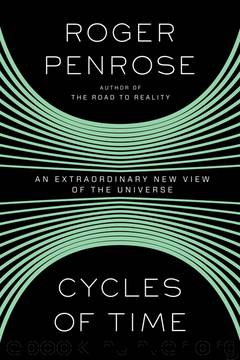Cycles of Time by Roger Penrose

Author:Roger Penrose [Penrose, Roger]
Language: eng
Format: epub
ISBN: 978-0-307-59674-1
Publisher: Knopf Doubleday Publishing Group
Published: 2011-05-03T04:00:00+00:00
Fig. 3.4 There will be the occasional ‘rogue’ electron or positron, ultimately trapped within its horizon and unable to lose its electric charge through pair annihilation.
A more radical resolution might be to suppose that charge conservation is actually not one of Nature’s stringent requirements. Accordingly, it might be the case that, at extremely occasional moments, a charged particle might decay into one that is without electric charge, and over the reaches of eternity, all electric charge could, accordingly, eventually vanish away. On this consideration, electrons or positrons might eventually become converted into one of their uncharged siblings, say a neutrino, in which case it would also be a requirement that, among the three known types of neutrino, there is one without rest-mass.[3.15] Quite apart from there being no evidence whatever for any violation of charge conservation, such a possibility is an extremely unpleasant one, theoretically, and it would also seem to demand that the photon itself acquire a small mass, which would in itself nullify the proposed philosophical standpoint.
The one remaining possibility that occurs to me, and which actually strikes me as something to be considered seriously, not merely the least of all evils, is that the notion of rest-mass is not the absolute constant that we imagine it to be. The idea is that over the reaches of eternity, the surviving massive particles—the electrons, positrons, neutrinos, and also protons and antiprotons, if they do not eventually decay, and moreover whatever might be the constituent of the dark matter (necessarily without charge, but possessing rest-mass)—would find that their very rest-masses would very, very gradually fade away, attaining the value zero in the eventual limit. Again, there is absolutely no observational evidence, as of now, for such a violation of ordinary notions concerning rest-mass, but in this case the theoretical backing of the conventional ideas is far less substantial than for charge conservation. In the case of electric charge, we have an additive quantity, in the sense that the total charge of a system is always the sum of all its individual constituents, but with rest-mass, this is certainly not the case. (Einstein’s E=mc2 tells us that the kinetic energy of the motions of the constituents will contribute to the total.) Moreover, although the actual value of the basic electric charge (say that of the anti-down-quark, which is one third of that of the proton) remains a theoretical mystery, the values of all other charges found in the universe are whole-number multiples of this value. Nothing like this appears to be the case for rest-mass, and the underlying reason for the particular values of the rest-masses of individual particle types is completely unknown. So there appears to be still the freedom that the rest-mass of a fundamental particle is not an absolute constant—as indeed it is not, according to standard particle physics, in the very early universe, as remarked above, in §3.1—and that it might indeed fade away to zero in the very remote future.
In relation to this, one final technical comment may be made concerning the status of rest-mass in particle physics.
Download
This site does not store any files on its server. We only index and link to content provided by other sites. Please contact the content providers to delete copyright contents if any and email us, we'll remove relevant links or contents immediately.
| Aeronautics & Astronautics | Astronomy |
| Astrophysics & Space Science | Comets, Meteors & Asteroids |
| Cosmology | Mars |
| Solar System | Star-Gazing |
| Telescopes | UFOs |
Tools of Titans by Timothy Ferriss(8369)
Turbulence by E. J. Noyes(8040)
Secrets of Antigravity Propulsion: Tesla, UFOs, and Classified Aerospace Technology by Ph.D. Paul A. Laviolette(5369)
Astrophysics for People in a Hurry by Neil DeGrasse Tyson(5182)
Room 212 by Kate Stewart(5105)
Design of Trajectory Optimization Approach for Space Maneuver Vehicle Skip Entry Problems by Runqi Chai & Al Savvaris & Antonios Tsourdos & Senchun Chai(5066)
Pale Blue Dot by Carl Sagan(4996)
The David Icke Guide to the Global Conspiracy (and how to end it) by David Icke(4709)
A Journey Through Divination and Astronomy by Publishing Pottermore(4379)
Goodbye Paradise(3802)
Apollo 8 by Jeffrey Kluger(3705)
COSMOS by Carl Sagan(3618)
The Five People You Meet in Heaven by Mitch Albom(3562)
Losing the Nobel Prize by Brian Keating(3534)
How to Read Water: Clues and Patterns from Puddles to the Sea (Natural Navigation) by Tristan Gooley(3466)
Brief Answers to the Big Questions by Stephen Hawking(3430)
How to Read Nature by Tristan Gooley(3335)
The Order of Time by Carlo Rovelli(3188)
A Brief History of Time by Stephen Hawking(3022)
